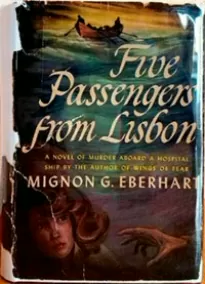Five Passengers from Lisbon

- Автор: Mignon Eberhart
- Жанр: Детективы
Читать книгу "Five Passengers from Lisbon"
4
She wanted to cover them with her own hands. As she had had to do so many times, she smothered the impulse which would disclose pity. She had already in her heart recognized the necessity of preserving the pride which, he had said, was the only thing he had left out of that golden wealth of promise.
She started also to remind him, sensibly and as matter-of-factly as possible, that the important thing was to be alive, to emerge—living, breathing, able to talk and walk and even laugh again—from a horror which so many did not survive. But that too seemed without substance; contemplating the misfortunes of others does not lighten one's own trouble but instead adds to it.
The thing to do then was to fasten upon the subject at hand, think about that, talk about that. Andre Messac and a false passport, on which Mickey proposed to enter the United States. And perpetuate a false identity which he proposed to assume for the rest of his life. A shadow of all sorts of potential legal complications hovered at the edge of her mind; but just then the main point at issue was a simple, clear question of honesty. In a curious way the project of using Andre Messac's papers had not seemed dishonest in Lisbon. It had seemed an expediency, a therapeutic measure which was so important just then to Mickey that the use of the passport was as uncomplicated by scruples, as direct and purposeful as the use, say, of an oxygen tank for a person with pneumonia. It had seemed lucky that the photograph on the passport was, Mickey had said, so bad and blurred that Mickey—or indeed almost anyone—could use it. Once in Buenos Aires they would straighten the thing out, make a clean breast of it, wait until Mickey could enter the United States on the quota, if that was necessary. He was a French citizen; she knew that. He had been educated not only in Paris but in New York, so English was like his mother tongue.
Concerned mainly with the desperate and sometimes despairing hope of restoring Mickey to himself, she had thought only of that. The way had opened which seemed right, and she had snatched at it gratefully and tucked the other and inevitable problem away to be faced when they reached it. And now they had reached it, suddenly, unexpectedly and urgently.
It was the more urgent, naturally, because of the murder of Alfred Castiogne. No matter how briefly he had entered their lives, nor how little he had meant to them as a person, the mere fact of the murder occurring as and when it had occurred, entangled them, brought the light of an investigation to bear upon every person in that lifeboat. All her instinct was for going to Captain Svendsen and telling him the whole truth.
But Mickey, she saw suddenly, had intended all along to do this very thing. Never would anyone really know what had happened to Michel Banet; a new name, a new personality was to be his shield. Knowing Mickey as he had been before the war brought a crashing end to his bright world, and knowing him now, she could not fail to comprehend it. It was exactly like Mickey. He had returned to her probably, only because his love for her was greater than his pride.
She said suddenly, out of the silence: "Who was Andre Messac?"
Mickey lighted another cigarette and squinted at the smoke clouds floating off into the night. "He was one of us," he said.
She waited, again instinctively avoiding direct questions. He would tell her what he could tell her, whatever he could bring out of tragic memory and into painful words. He said: "He was arrested at the same time that I was. He died—later. I never knew exactly how, or, as a matter of fact, when. But I saw his mother in Paris; she still had his clothes and papers and all that. There had not been time when we were arrested that day to do anything, to get any of our personal possessions. There wasn't time for anything. I remember trying to get them to let me phone to you."
She had tried to telephone to him too. She had known in her heart that there was disaster; she had tried to reach his apartment. The telephone had been taken over at government orders; the streets were choked with people and frenzied confusion. When she reached his apartment the concierge had fled and nobody could tell her anything.
She said, shifting the memory of that day: "That's in the past."
"Yes. Yes, of course. You keep telling me that. It's true of course, but—well, never mind. To make it short, she gave the passport to me, and I knew somebody who could fix it all up with visas and so forth. You learn things like that—but . . ." He paused and then said deliberately: "I never really let you see his passport, did I, Marcia? You see, it's his passport but it's my photograph. I had it put on, in place of his. I—never intended to resume my own name. You may as well know that now."
It was, then, as she had so recently guessed. She waited for a moment, seeking words, seeking arguments and finding none that would avail against that long and stubborn scheme. "No," she said. "No . . ."
"I have thought it over. That is my decision, Marcia. You must help me. It means so much to me."
"But, Mickey, it isn't practical. People will recognize you. You've appeared in concerts. . . ."
"People in an audience never remember the face of a pianist. Nonsense!"
"All your friends, all the people who knew you . . ."
"Marcia, you don't understand. I'll never play again. I knew a very small, circumscribed group of people. Mainly people interested in music. Well, all that and those people are out of my life. I'm Andre Messac now. A new identity, a new life . . ."
"You can't. . . ."
"And I depend on you, Marcia. I want a new life. I didn't want it really, when I found you in Marseilles. I didn't want anything except to see you again. I'd thought of you, all those years of horror. There were times when I could keep alive only by thinking as hard as I could about you, holding some clear memory as if it were a symbol, a tangible thing. The thought of you actually, my darling, was as sustaining as—a piece of bread. That doesn't sound very fancy and high-flown, does it? But it's true."
Her throat had closed up tight again. There was fine cool spray against her face, but there were tears too, remembering the time at the villa with its stone floors and walls, its emptiness, the longing for Mickey that every minute held. She said, her voice uneven: "For me too, Mickey. I often wished that we had married, that winter in Paris."
"I wished it, too. Yet at the time, with everything so confused, so uncertain, it seemed better not to. We were wrong, I expect. I was sorry, too. There was so much time to think of everything as it might have been. Well, as you say, that's in the past. Only I desperately want it to remain in the past, my darling. I want everything new for us. Everything on a clean slate. No clutter from the past, and no echoes of what I might have become."
"We ought to have gone to America that winter, while we still could. I thought of that, so many, so many times I thought of that."
"How could I?" asked Mickey simply. "I'm a Frenchman. How could I have gone?"
It had been his argument then. She sighed and shivered a little, and pulled the thick brown coat with its brave red lining tighter around her. And suddenly for a queer, illogical second she wished she could talk over the situation with the tall man in the red dressing gown she had met in the Captain's cabin—Colonel Josh Morgan.
A man she didn't know and had never seen in her life before!
She was tired; that was the explanation. She felt the need to lean upon someone and, until Mickey was better, she could not lean upon him. Contrarily, she must make herself strong and certain, so that Mickey now, while he needed it, could derive some strength from her.
Obviously, then, she could only agree to his plan, fall in with it for the time being. Until Mickey himself grew stronger —not physically, but within that core that men can only call a soul. Until he was certain again that life was good, desirable; until he had regained confidence and assurance and, mainly, his grip upon the reality, the sunshine and gaiety and dear, homely honesty of home. It might be slow in coming, but it would come.
She said, however, with odd feminine tenacity: "I think we should tell Captain Svendsen—no one else. I liked him. I believe he'd understand and—and help. . . ."
Mickey whirled around toward her. "No, Marcia! He'd have to tell. He has to do whatever his duty is. He couldn't conceal my real name; he'd have to report it. There's nothing else for him to do. You can't say anything to him that would induce him to swerve an inch from his job. I saw him; I talked to him; that's the kind of man he is. If you tell him who I am, Marcia, everybody will know it." He stopped and searched her eyes almost incredulously. "Does my only chance for a new life mean so little to you?"
"Oh, no, no, Mickey. I love you. . . ." She put her hands upon his then, but his hands were cold. His eyes were those of a stranger for an instant, so she seemed to be reaching out toward someone who was not there.
That, too, must be the effect of fatigue and nerve strain. And Mickey said unexpectedly: "Do you really love me?"
He didn't really mean that. She must have patience, infinite patience, and again she thought, strength for both of them just now. If the night past had frayed her own nerves and physical endurance, what must it have done to Mickey? She put her arm through his own. "Mickey, Mickey, you know that I love you."
"Well, then call me Andre, not Mickey. You will, won't you, Marcia?"
"Yes, until we can straighten it out."
"What do you mean by that?"
It had been the wrong thing to say. She felt again that she was being stubborn and feminine. She was right and yet wrong; it was almost as if they were quarreling.
"Mickey, I'd never do anything you asked me not to do. We mustn't talk like this. It is wonderful simply that we are standing here together, alive and beside each other. Last night . . ."
"Yes. Last night! I have been thinking about this man Castiogne. It is hard to believe that he was murdered in the lifeboat. I can see how it could have happened without any of us being aware of it. But what I can't understand is why. We were all on the point of being drowned at any instant. Even if somebody wanted to kill him, it seems pointless. Every one of us stood such a good chance of being dead at any time during the night. Luther Cates thinks the same thing. Naturally, it was one of the seamen, crazed perhaps by fear. Until he confesses, I suppose it will be more or less unpleasant for all of us."
He broke off as someone came out on deck behind them.
"There you are," said Daisy Belle Cates. Marcia turned; Daisy Belle and Gili came toward them, both in nurses's uniforms and coats like the coat Marcia was wearing. Gili stopped beside Mickey. Her long golden hair was twisted to a heavy knot on top of her head; her face was without makeup, except for her full mouth which was deeply crimson with lipstick she had managed to borrow. She said: "What about the murder, Andre? What are they going to do? Do they suspect any of us? Do they think we did it?"
Daisy Belle said: "Could I have a cigarette, Monsieur Messac? Thank you." Mickey—Andre, Marcia reminded herself. Andre offered Daisy Belle the package in his hand and lighted the cigarette for her. She took a long puff and said: "Thank Heaven for that. I hope never to see another cigar in all my life, let alone smoke one."
Gili's long green eyes slanted once toward the older woman and then came back to Mickey. "Who do you think killed him?"
Mickey said: "I don't know."
Daisy Belle took another long, relishing breath, and tilted back her reddish-gray head and that fine-drawn profile to expel the smoke, slowly, savoring it. She said then: "Obviously it was one of the seamen. None of us knew or cared anything about the man. The only thing I know of him is that he was very handsome in a sort of peasant way and apparently lived on garlic."
Gili started to speak, sucked in her full red lips and stopped.
Mickey said: "I understand the seamen have been questioned; one of them will talk to save his own skin."
"It's an ironic thing," said Daisy Belle suddenly. "Life and death in that horrible lifeboat; pitching up and down in the waves and darkness, expecting death for all of us at any moment. Never suspecting that actually he was already dead. You saw something of him on the
"I know nothing of it!" cried Gili vehemently, her eyes flashing toward Daisy Belle. "Nothing at all. Oh, I talked to him a little on the ship. I never saw him before. Never once. But he"—she shrugged—"he was a man. He talked; I listened. He was nothing to me. Nothing." She paused again, appeared to consider her words and then turned to Mickey, linking her arm through his, and looking up confidingly and appealingly into his face. "You see, don't you, Andre? It was—well, call it a tiny bit of a flirtation; that's all. He was nothing to me. You understand?"
It was, thought Marcia, an instinctive gesture of Gili's part to enlist Mickey's sympathy and aid. Probably in the world she had known she had never been able to put her faith in women's friendship. It was men who ruled everything, and men could be cajoled, men could be enlisted on her side, men could protect her. She leaned one cheek toward Mickey's shoulder and moved it softly against him like a cat rubbing its head, purring and begging for something.
Well, that wasn't fair. Naturally she didn't like Gili's approach to Mickey; naturally she didn't like that arm linked through Mickey's, that golden head brushing his shoulder so softly, so gently. And it was silly, because Gili performed the little gesture as instinctively as she ate.
All the same, Marcia wished Mickey would move away from Gili, decisively. Which was silly, too; it meant nothing to him. Besides, Mickey was an attractive man; certainly Marcia did not intend to go through life having twinges of something very like jealousy every time another woman so much as looked at him. Mickey said: "Did he tell you anything about himself, Gili?"
"Nothing at all," she cried again. "Nothing. I tried to remember. I tried to tell the Captain. But there really wasn't anything. He"—a ghost of a complacent smile came into Gili's face—"he admired me, you know. He talked—oh, nonsense, mostly. But then, really, I only walked the deck a bit with him, leaned over the railing. Half the time I didn't listen at all. He was nothing to me. And now . . ." Suddenly the complacency of a woman admired left her face and her voice. She gave a shrug that this time was more like a shiver and said in a low voice: "I wish I'd never seen him. It's horrible. Death and murder and ... I don't like dead men."
There was a small, queer silence with only the rush of the ship through the water and the murmur of the radio in the distance. Then Daisy Belle said dryly: "I don't think anyone does, Gili. Especially if they've been murdered."
And Mickey said suddenly: "I'm going to talk to the Captain again."
"I'll go inside too." Gili hunched up her shoulders. "I'm cold. The sea frightens me. I was sure last night that we'd all be drowned. I'm going inside where it's warm and lighted." She turned with Mickey, still clinging to his arm. Mickey said: "See you here when I've finished, Marcia."
They vanished into the lighted passageway behind them. And after a moment Daisy Belle said, dryly again: "A man's woman."
"She can't help it."
Daisy Belle smoked for a moment, considering. "No. Actually she can't. She was born that way. And I suppose she's had to live that way. By the favors of a man's world. But," said Daisy Belle, "I think she'll manage. And there was more to that little affair with Castiogne than she pretends!" She laughed shortly, smoked, and added: "Not that I think she murdered him. It's merely instinct for her to cling to some man. The way she's"—she blew out smoke again, slowly, narrowing her eyes—"the way she's clinging to Andre. But Andre, if I may say so, is eminently clingable."
Marcia laughed. Suddenly, Daisy Belle's crispness and directness, the very sound of her flat dry voice seemed to dispel an annoying little cloud. How much did Daisy Belle know about her and about Mickey? How much had those sophisticated, knowledgeable eyes seen and stored away? She said, on an impulse: "You've never asked a question, Daisy Belle."
The older woman glanced at her rather sharply. "About you and Andre? Why should I?"
"Well, but-there we were, dumped down at that grisly little hotel in Lisbon. Traveling together . . ."
Daisy Belle laughed shortly. "My dear child, I've seen something of the world. You are obviously what you are—a decentish American girl who's been having rather a rough time of it, somehow. Andre is obviously what he is, too—a man who has had his own share of"—Daisy Belle paused and caught her breath and said—"of war and horror. Well, then; there you are, both obviously and comprehensibly anxious to get away from Europe, to get home; to straighten out your lives; to resume the kind of life that you and thousands of other men and women ought to have had. There you are—and I like you. What else is there to know? Don't be a fool. I wasn't born yesterday. And if it comes to that, what do you know of me and Luther?"
"Everybody knows about you!"
Daisy Belle's fine profile looked a little grim suddenly against the night. "What do they know?" she said after a moment.
"Why, who you are, all that. You are sort of fabulous, you know."
Again Daisy Belle did not speak for a moment. Then she said: "You mean—it is rumored that Luther and Daisy Belle Cates, well-known members of the so-called international set, are about to buy a house or sell a house, or back a horse, or get a divorce, or—or any damned bit of nonsense anybody can think up? That sort of thing?"
"Well, yes. Only it doesn't seem to fit you, now that I've known you."
Daisy Belle laughed shortly. "You can't imagine me being one of the ten best-dressed women, can you? Well, as a matter of fact, I wasn't. I only had big dressmaker's bills. It was all a question of money; Luther had so much, and so had I. You don't choose your way of living, Marcia; it chooses you. Not that any of that matters now. The point is, how did we get here? At this moment," said Daisy Belle, her eyes narrow and thoughtful, as if she saw a picture somewhere in the blackness beyond that rosy area of light surrounding them, "at this special instant in history. Well, we were in Paris when the Germans came. We went to the Riviera. After a while the Germans came there, too. They were everywhere. . . ." Her elegant, straight shoulders made a little movement of distaste. "Luther was very ill, for a long time. We stayed with a—a friend; in a chateau in the hills back of Nice. Eventually the war was over and we decided to go to Buenos Aires. So here we are."
She stopped. It struck Marcia that there was something tentative in her deliberate pause, something expectant.
Marcia said: "It will be good to be at home."
"Will it?" said Daisy Belle. "Will it? I'm sure I hope so. Well . . ." She had smoked the cigarette down to the last small end of it; she tossed it abruptly into the sea. "I'm going to find Luther. I do think that this Castiogne person took a very inconvenient time to get himself murdered. Of course Gili could have done it, but I don't think she did. For one thing she was too scared. But one of the seamen will eventually confess and that will be the end of that." She patted Marcia's shoulder once, hard, and walked briskly away.





